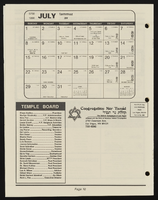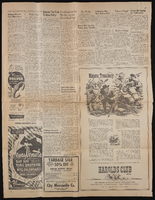Search the Special Collections and Archives Portal
Search Results
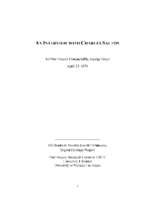
Transcript of interview with Charles Salton by George Green, April 23, 1976
Date
Archival Collection
Description
Interview with Charles Salton by George Green on April 23, 1976. Salton discusses arriving in Las Vegas in 1929, after his family had moved from New Jersey to Huntington Beach, California. His father sold real estate, and expected a boom after the authorization for the construction of Hoover Dam. His father was involved in bootlegging and then owned Al's Bar, a drinking and gambling establishment, on the alley at South First Street. Salton describes the area around Fremont Street and Las Vegas Boulevard with businesses and grocery stores, the grammar school and high school, and the hospital. Salton talks about his social activities, including involvement in the Jewish Community Center (Temple Beth Sholom), and several of the bars, clubs and casinos in the area. He briefly discusses the mob influence in the casinos versus corporate ownership and then speaks about the education system in Clark County.
Text
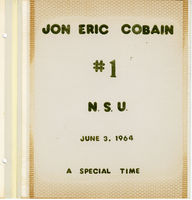
Jon E. Cobain Nevada Southern University graduation scrapbook
Date
Archival Collection
Description
Jon Eric Cobain's scrapbook with photographs, articles, and items from the June 3, 1964 first graduation of Nevada Southern University (later UNLV).
Mixed Content

Virginia Houser interview, March 20, 1978: transcript
Date
Archival Collection
Description
On March 20, 1978, collector Karen Reed interviewed her grandmother, Virginia Houser (born on August 22nd, 1912 in Bartonville, Illinois) at her home in Las Vegas, Nevada. In the interview, Virginia Houser discusses working in Las Vegas at various stores as well as changes in the Downtown and Strip areas. She also speaks about the annual Helldorado Parade and other entertainment in the Las Vegas area besides gambling.
Text

Transcript of interview with Pauline Barlow and Katie Ford by Caroline Logsdon, March 20, and April 7, 1976
Date
Archival Collection
Description
On March 20, 1976 Caroline Logsdon interviewed Pauline Barlow (unknown date or place of birth) about her life in Southern Nevada. Barlow first talks about her move to Las Vegas at a young age, her church membership, and her membership in social clubs. She also talks about gambling, the atomic testing, and the changes she has seen over time in Las Vegas. On April 7, 1976, Logsdon also interviewed Katie Ford (born 1929 in Ely Nevada) about her life in Southern Nevada. Ford talks about her early life and education in Nevada in Beatty, Nevada, her work with her family-owned gas station and hotel, and some of the early buildings in Beatty. She also discusses early recreational activities, the atomic testing, economic and environmental changes, improvement in technology, and social changes.
Text

Interview with Jacob "Chic" Hecht, May 11, 2004
Date
Archival Collection
Description
Text
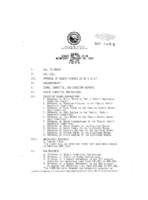
Meeting minutes for Consolidated Student Senate University of Nevada, Las Vegas, February 26, 1992
Date
Archival Collection
Description
Text
Frey, James H. (1941 June 29-)
James Frey was born in Eureka, South Dakota, in 1941. His father worked in creamery and his mother was a registered nurse. When Frey was nine, the family, including his twin sister, relocated in Sioux Falls where his dad was plant manager for a dairy. He joined the YMCA in the fourth grade and ended up working for them until around the age of 22. He attended Augustana College in Sioux Falls, graduating with a major in sociology and a minor in history. After graduation, he worked for three years at the YMCA in Sioux Falls as program director.
Person

Transcript of interview with Charles Nur Fernald by Claytee D. White, May 31, 2014
Date
Archival Collection
Description
Text

